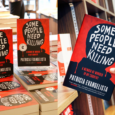A long-held common belief is that couples who are completely harmonious in their relationships and never fight are more likely to work out in the long run. Different studies in psychology are now delving into this misconception in order to show how fights can actually be healthy in relationships sometimes. The caveat is that there must be productive ways to process the fights you have with your significant other.
(Life After a Toxic Relationship)
Clinical psychologist Deborah Grody begins her case by stating that married couples who never have any conflict are, in fact, the ones who end up in divorce. This is because couples who don’t fight tend towards indifference and lose the will to fight when they don’t care enough about anything anymore. She explains: “Relationships that can’t be saved are relationships where the flame has completely gone out, or it wasn’t there in the first place.”
Still, fights between couples are not valuable just for the sake of fighting. They become useful for the relationship when used to reach understanding and compromise. A study by the Society for Personality and Social Psychology contends that there are benefits to fighting your partner, as long as it’s done in a constructive way.
(Dating & Dumb Decisions: Crazy Relationship Don’ts Learned the Hard Way)
The paper argues that “sometimes expressing anger might be necessary to resolve a problem – with the short-term discomfort of an angry but honest conversation benefiting the health of the relationship in the long-term.” Meaning, those arguments you have with your partner would be most helpful if you’re able to iron out the problems afterward.
Noam Ostrander, an associate professor of social work at DePaul University, expounds that one way to work out argument is to be curious about them as a couple. Any couple is likely to have an issue they routinely bicker about, one that is termed “the 5:30 fight.” This is a repetitive fight that couples will have over and over without ever resolving anything. To end it, or to make it better, couples must care enough to discover what triggers it and how to settle it once and for all.
(How Long Should You Date Someone Before Entering a Relationship?)
Another way to have ‘healthier’ fights, according to Grody, is to conduct them when tempers aren’t flaring. If a fight is beginning to erupt and you are aware your emotions could make you impulsive she suggests putting a pause to the fight and seeking out space to think things through instead. The fight should be picked up when both parties are able to actually discuss the problem rather than just attack each other.
In line with this is Ostrander’s contention that arguments often incite the “fight, flight, or freeze” instinct within us. That means we are either triggered to fight the stressor, run from it, or just be unable to react at all. When forced into these modes there is no productive discussion that is able to happen as we rely on instinct rather than logic. Ostrander then suggests putting a pause to the fight, as well: “If you’re really upset with someone and they’re trying to problem solve, it can feel like they’re not even listening. I often encourage, in those moments, that someone needs to call a timeout.”
(According to Science, Crying Can Actually Help You Lose Weight)
Essentially, the key to fights doing more harm than good in relationships is being able to communicate with your partner. Fights are only as bad as the inability to resolve and progress from them. Ignoring issues or choosing to ‘forgive and forget’ without working anything out will be worse in the long run.
What’s your take on this?







